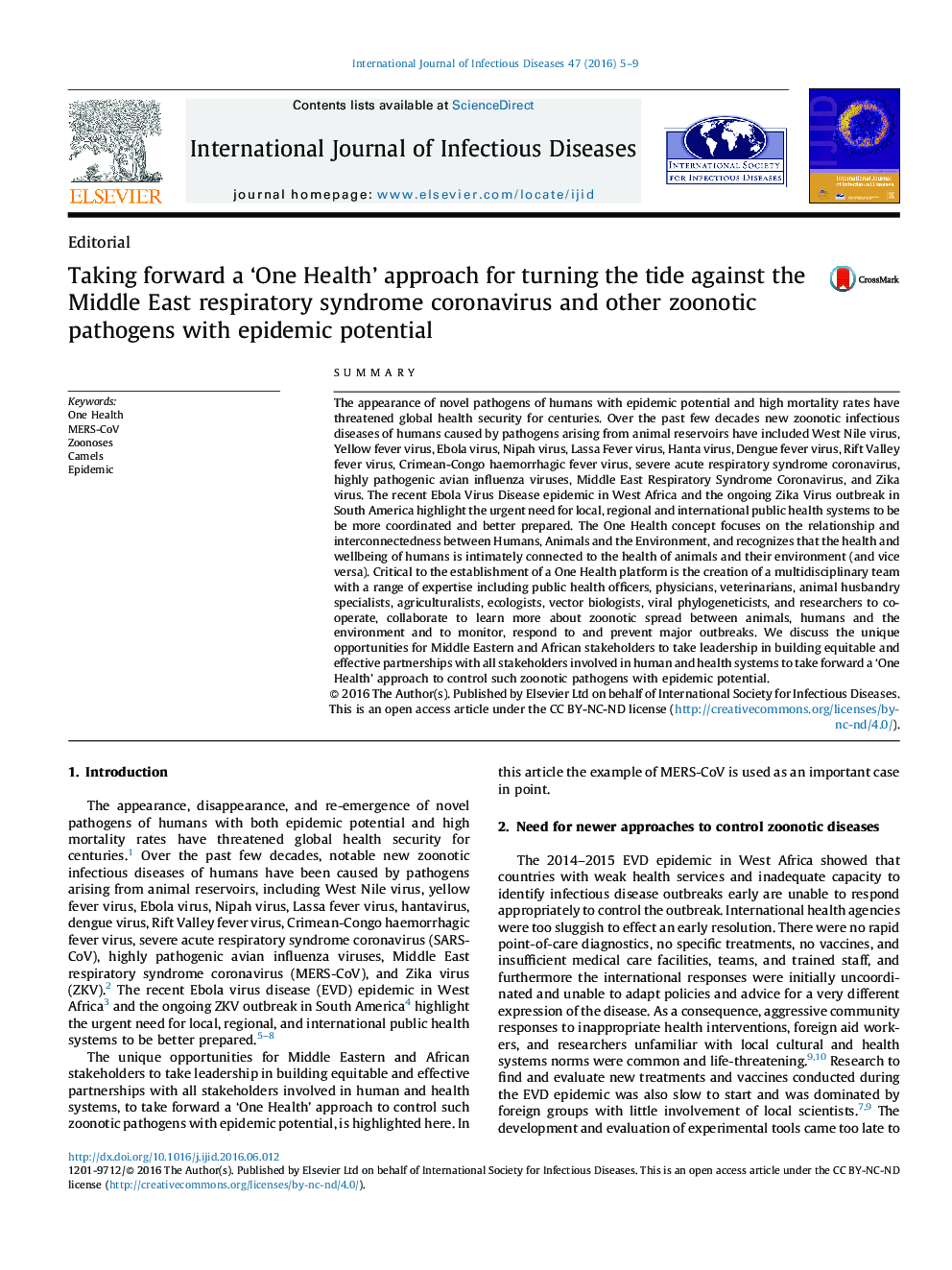| کد مقاله | کد نشریه | سال انتشار | مقاله انگلیسی | نسخه تمام متن |
|---|---|---|---|---|
| 3361775 | 1592047 | 2016 | 5 صفحه PDF | دانلود رایگان |
• The appearance, disappearance, and re-emergence of pathogens of humans with epidemic potential and high mortality rates have threatened global health security for centuries.
• Global public health authorities should have been better prepared for the recent Ebola virus disease (EVD) epidemic in West Africa.
• The current Zika virus outbreak is diverting the attention of public authorities and governments from other important infectious diseases that continue to threaten global public health security; one such disease lurking in the background is the Middle East respiratory syndrome (MERS).
• The emergence of the MERS coronavirus (MERS-CoV) in 2012 was the second time (after severe acute respiratory syndrome coronavirus (SARS-CoV)) that a new coronavirus, highly pathogenic for humans, emerged in the 21st century. Whilst most MERS cases have been reported from the Middle East, MERS cases have been reported from 27 countries in all continents.
• MERS-CoV has been found in camel populations of Eastern Africa and the Middle East, and with millions of pilgrims visiting Saudi Arabia and returning home every year, the movement of MERS-CoV to new locations presents a real threat to global health security.
• With animal, human, and environmental factors playing a critical role in its evolution, MERS-CoV represents a classical zoonosis.
• A serious and more collaborative and coordinated MERS-CoV response plan is required to better define MERS-CoV epidemiology, transmission dynamics, molecular evolution, optimal treatment and prevention measures, and development of vaccines for humans and camels.
• The ‘One Health’ concept focuses on the relationship and interconnectedness between humans, animals, and the environment, and recognizes that the health and wellbeing of humans is intimately connected to the health of animals and their environment (and vice versa).
• A ‘One Health’ approach is ideally suited to the MERS-CoV situation and requires close cooperation between those who provide human health, animal health, and promote environmental and ecosystems health.
• Critical to the establishment of a ‘One Health’ platform is the creation of a multidisciplinary team with a range of expertise to learn more about zoonotic spread between animals, humans, and the environment, and to monitor, respond to, and prevent major outbreaks conductive sociopolitical and economic framework for action.
• The persistence of MERS-CoV 4 years since its first discovery has created major opportunities for Saudi Arabia or one of the other Middle Eastern countries to take leadership of the ‘One Health’ approach to tackling new emerging and re-emerging infectious diseases with epidemic potential in their region.
• Parallel initiatives across Africa and the tropics could be harmonized to create regional networks that can serve as a repository for expert ‘One Health’ advice on safe and sustainable agricultural systems, especially for livestock, in support of human development.
SummaryThe appearance of novel pathogens of humans with epidemic potential and high mortality rates have threatened global health security for centuries. Over the past few decades new zoonotic infectious diseases of humans caused by pathogens arising from animal reservoirs have included West Nile virus, Yellow fever virus, Ebola virus, Nipah virus, Lassa Fever virus, Hanta virus, Dengue fever virus, Rift Valley fever virus, Crimean-Congo haemorrhagic fever virus, severe acute respiratory syndrome coronavirus, highly pathogenic avian influenza viruses, Middle East Respiratory Syndrome Coronavirus, and Zika virus. The recent Ebola Virus Disease epidemic in West Africa and the ongoing Zika Virus outbreak in South America highlight the urgent need for local, regional and international public health systems to be be more coordinated and better prepared. The One Health concept focuses on the relationship and interconnectedness between Humans, Animals and the Environment, and recognizes that the health and wellbeing of humans is intimately connected to the health of animals and their environment (and vice versa). Critical to the establishment of a One Health platform is the creation of a multidisciplinary team with a range of expertise including public health officers, physicians, veterinarians, animal husbandry specialists, agriculturalists, ecologists, vector biologists, viral phylogeneticists, and researchers to co-operate, collaborate to learn more about zoonotic spread between animals, humans and the environment and to monitor, respond to and prevent major outbreaks. We discuss the unique opportunities for Middle Eastern and African stakeholders to take leadership in building equitable and effective partnerships with all stakeholders involved in human and health systems to take forward a ‘One Health’ approach to control such zoonotic pathogens with epidemic potential.
Journal: International Journal of Infectious Diseases - Volume 47, June 2016, Pages 5–9
